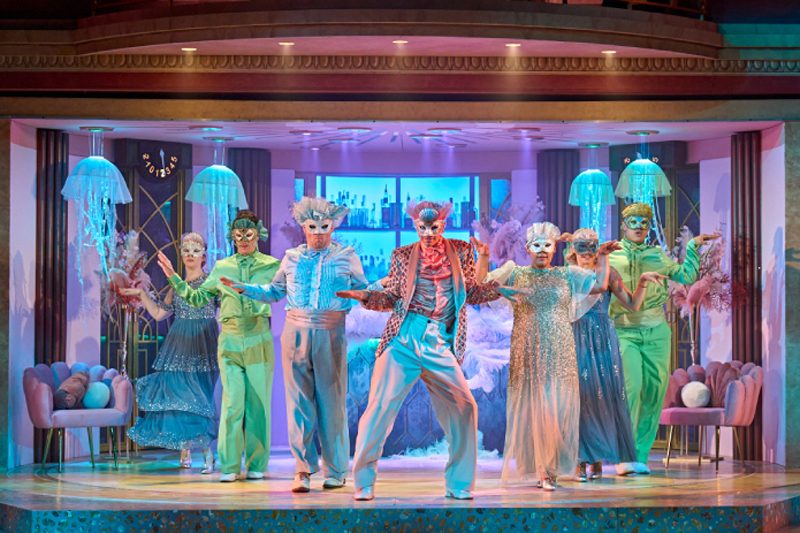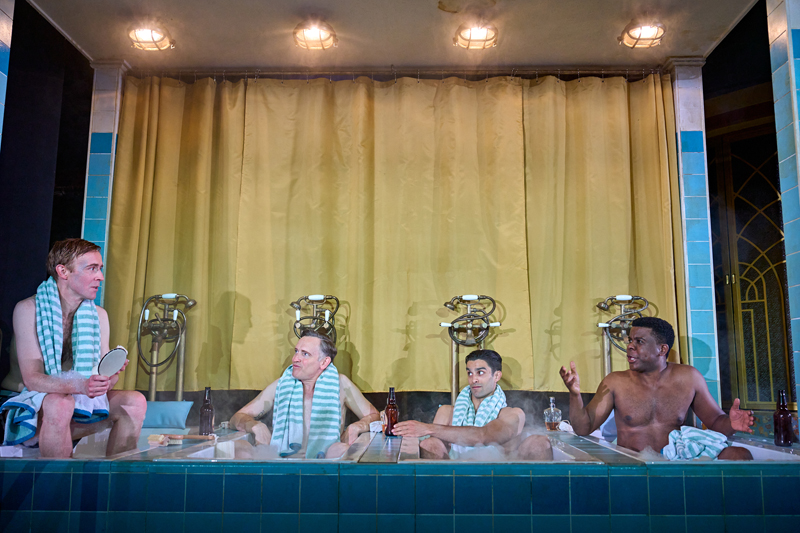“Much Ado About Nothing” – National Theatre
Neil Dowden on the South Bank
24 July 2022
Hot on the heels of revivals of Much Ado About Nothing by the RSC and the Globe comes another production of Shakespeare’s summery rom-com at the National Theatre. Like the latter’s, this version takes place in twentieth-century Italy, but it is the 1930s rather than 1945 – though it’s not clear which war the soldiers are returning from, while there is no reference to Mussolini’s fascist regime. Simon Godwin’s feelgood show is stylish, escapist entertainment with high production values that doesn’t quite hit the romantic or comedic sweet spots.

John Heffernan and Katherine Parkinson.
Photo credit: Manuel Harlan.
The action takes places inside and outside Hotel Messina in Sicily. The setting has a laid-back Mediterranean feeling combined with designer chic. Evie Gurney’s attractive, colourful costumes – seen at their most glamorous in the masked ball which features ostrich feathers – set the tone for this jaunty romp. Anna Fleischle’s sumptuous Art Deco set uses a revolve to present both the hotel reception inside and the exterior, plus there is a spa room rising from below stage, bathing costume-changing tents, and a hammock. The upstairs balcony floor is well used for the Margaret/Borachio erotic assignation, as well as for stationing a jazz swing band that adds fizz to proceedings.
Although technically the subplot, the most memorable aspect of Much Ado is of course the sharp-witted banter and slow-burning love of Beatrice and Benedick, whose determination to remain single fools no one apart from themselves. It’s a battle of the sexes provoked by frustrated mutual passion. Unfortunately, here, the sparks only fly fitfully.

The ensemble at the ball scene. Photo credit: Manuel Harlan.
Katherine Parkinson is a fine comic actress (so good in the National’s production of Laura Wade’s gender-relations satire Home, I’m Darling, as well as Channel 4’s sitcom The IT Crowd) but – perhaps due to lack of experience in speaking Shakespearean dialogue – she doesn’t always make the most of Beatrice’s witheringly funny put-downs. She makes clear that Beatrice has been hurt emotionally by Benedick in the past, but there isn’t a strong enough sense of a powerful attraction pulling them together beneath the surface of their biting exchanges.
As Benedick, John Heffernan is more at ease with the language, and is often very amusing (though the funniest moment is probably a physical gag where he emerges from his hiding place eavesdropping under a gelato cart covered in ice cream). Rather than playing him with the usual bombastic machismo, his Benedick is more diffidently eccentric. Perhaps the idea is that the pair are outsiders who respond to this misfit quality in each other, but it takes a while for the chemistry to get going.

John Heffernan, Rufus Wright, Eben Figueiredo and Ashley Zhangazha.
Photo credit: Manuel Harlan.
In fact, the dark – indeed potentially tragic – dimension of the play has more impact than usual in this production, even though the melodramatic machinations of the motiveless villain Don John (played with muted surliness by David Judge) still make little sense. The innate misogyny of Eben Figueiredo’s Claudio (who speaks in Multicultural London English) and the normally affable Don Pedro (Ashley Zhangazha) in being so quick to believe Claudio’s fiancée Hero is unfaithful is shocking. But it is counteracted by the feisty rebuttal of Ioanna Kimbook’s Hero and (in a gender-changed role) the protective anger of her mother Antonia (Wendy Kweh), who puts her husband Leonato (Rufus Wright) to shame for briefly doubting his own daughter.
Indeed, the women in the play come across forcefully, with even the maid Margaret (an engaging Phoebe Horn) given more outlets of expression than normal. In contrast, dramaturg Emily Burns has cut quite a lot of the farcical scenes involving the incompetent night watch (presented here as hotel security), which admittedly can become tiresome if not done extremely well. David Fynn, however, excels in the role of Dogberry, getting more laughs from his dextrous physical performance than from the character’s verbal infelicities.
Godwin (currently Artistic Director of the Shakespeare Theatre Company in Washington, DC, but one of the main contenders to succeed Gregory Doran at the helm of the RSC for whom he has already directed successfully) has had some notable hits with Shakespeare at the National where he was associate director. They include Twelfth Night (with a gender-switched Malvolia played by Tamsin Greig), a superb Antony and Cleopatra (starring Ralph Fiennes and Sophie Okonedo), and a revelatory Romeo and Juliet (turned into the National’s first film due to Covid lockdown). Compared to these productions, his Much Ado may seem a bit disappointing, but it still exudes an easy-going charm that is hard to resist.









